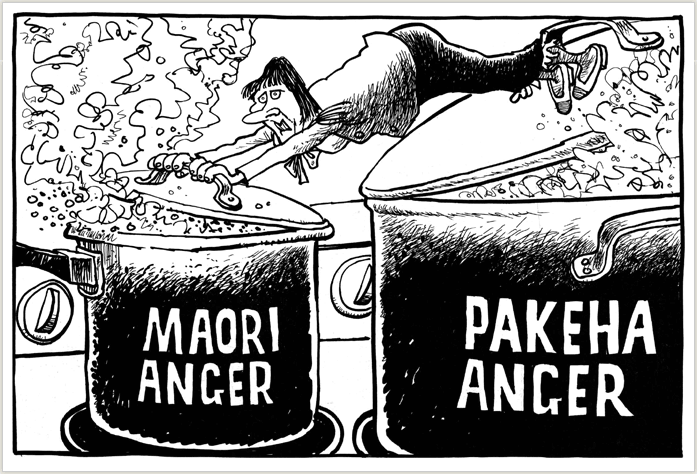Section 1 -
- Name some of the different groups who began visiting New Zealand in the early 1800s. Describe the ways they interacted with Maori.
The different groups of people that came to New Zealand were Missionaries, Whalers, Sealers, Traders, and people from Britain were also here to explore or to exploit the natural resources.
2. What were some of the main reasons that led to the making of the Treaty of Waitangi ?
The British wanted sovereignty over New Zealand, to establish a government, to maintain peace and to protect Maori rights. The Maori wanted undisturbed possession of lands and property.
3. Cartoons - select one and describe what you see. What do you think the message is? What point of view do you think the cartoonist is representing?
I see two pots each with “Maori anger” and “pakeha anger’, and a person is on both, trying to close the lid. The anger of the pakeha is big, while the anger of the maori is smaller. I think the message is that the pakehas were angry at the Maori, but I disagree with this cartoon. I think that the Maori people were more angry with the pakeha than the pakeha were with them. The point of view of think the cartoonist is representing is that to prevent the anger of both nations from overflowing, someone needs to stop the anger at each other, and they should be more kinder to each other.
Section 2 -
- What are the key differences between the Maori and English versions of the Treaty of Waitangi ?
The key differences are that in the Maori version, they are offered full chieftainship of their lands and property. Also, Maori have the protection of the British Crown and the same rights as the British subjects. In the English version, the British Government want sovereignty over New Zealand. In the Maori version, this is described as governorship. The English version also said that the Maori were to allow the Queen to establish a Government here to maintain peace and to protect Maori rights.
2. List some of the reasons why chiefs did or did not sign the Treaty?
I think some of the chiefs did not sign the Treaty was because they didn’t know what they were signing, they were worried about the changes. The reasons why some chiefs did sign the Treaty was because they saw the Treaty as a sacred bond or covenant directly between themselves and Queen Victoria.
3. Name two people who signed the Treaty. Can you locate which Treaty they signed?
- Tamati Waka Nene - He signed the very first Treaty shown up at Waitangi.
- Hongi Heke - He was one of the first people to sign the Treaty at Waitangi along with Tamati Waka Nene.
It does not say what copy of the Treaty they signed.
Section 3 -
- List some of the ways that Maori have brought their concerns to the attention of New Zealanders. Give details of at least 3 examples.
The Maori struggled to get their voices heard, despite by legal efforts, protests and hundreds of petitions.
2. What is the function of the Waitangi Tribunal?
The function of the Waitangi Tribunal is to start working through Maori concerns.
3. Choose one of the following case studies: Orakei, Manukau, or Ngai Tahu. In your own words, write a brief summary of the case.
The Manukau Claim - The Manukau Claim was about restoring Manukau. The Harbour was once a dumping ground for waste and sewage from rapidly growing Auckland. Maori living in Manukau despaired at the spoiling of their Harbour, long treasured for its fisheries. The public became more concerned about the environmental mess, and everyone wanted to do something about it. The Waitangi Tribunal’s report from 1985 was where the change started. New relationships were built between Maori living in the area, local government bodies, businesses, and people of the community. Manukau Harbour was later restored to its natural beauty. There is a strong connection with this historical place and the people.
4. Audio post - Listen to one of the poems or songs at the audio post. Describe the meaning or message behind the song. Who do you think it is aimed at?
Bob Orr - Broken Words
I stood
totally inarticulate
before a blue and white coast
as your mother told me
how each
grain of sand
had been stolen.
I think the meaning or message behind this poem is that someone was listening to a story of a mother telling her son a story of how the beach had been stolen, maybe by pakeha people. I think this is aimed at the pakeha people because when they came, things started happening, and the pakehas started claiming land that wasn’t theirs to claim.
No comments:
Post a Comment
Note: only a member of this blog may post a comment.